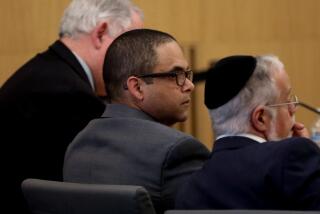Judge to rule on reopening 1995 murder and dismemberment case
A judge listened to closing arguments Thursday on whether to reopen a case involving a man who has already served almost 15 years of a life sentence for a notorious 1995 dismemberment killing in Santa Clarita.
“Something unusual is going on here,” Superior Court Judge Gregory A. Dohi said at the conclusion of two days of arguments in the habeas corpus hearing in Van Nuys. A ruling will come after the holidays, he said.
Edward Contreras, now 40, was convicted in 1997 along with Scott Taylor of killing their friend, Frederick Walker, at a backyard barbecue and stealing a $635 cash inheritance that Walker was carrying. A key witness in 2009 recanted her testimony implicating Contreras.
Deputy Dist. Atty. Juan Mejia told the court Thursday that there is no proof that the witness, Lisa Garringer, who was then 16, wasn’t telling the whole truth and that there is no evidence that investigators coerced her into saying the two men were involved.
Mario G. Conte, an attorney with the California Innocence Project, which took on the case in 2009, argued that Garringer saw the questioning by investigators as “intimidating and coercion,” and testified to that in a June hearing as part of the habeas petition.
Taylor, who also is serving a life sentence, has testified that he alone killed Walker, who was beaten, beheaded and then cut up with a machete. The body parts were later dumped in nearby Bouquet Canyon.
In her original testimony, Garringer said she told investigators that Contreras helped Taylor beat up Walker and dispose of the body.
“It’s not reasonable to believe that these experienced homicide detectives go with a two-person theory,” Mejia said. “They had Scott Taylor, why come up with this?”
Mejia played a tape of the original interview conducted by the investigators, both of whom are now retired, and said the questions put to Garringer and her mother, Rosalyn Blaser, didn’t seem forced.
“Instead of continuing to ask about the second man involved,” Mejia told the court, “they ask about the house.”
Garringer, however, testified in June that she lied to investigators because she was afraid Taylor might not otherwise be convicted and would then come after her.
“I wanted everything to be over.... I was afraid Scott Taylor was going to get out if [Contreras] wasn’t convicted too,” Garringer is quoted in court transcripts as saying, fully aware she could be tried for perjury for her admissions. She and Contreras were in the house “freaking out,” she said, when Taylor attacked Walker with a machete outside.
As for her mother’s situation, Garringer testified that she was worried her mother would be deported because she had a felony on her record.
“My mom’s never been a citizen of the United States,” Garringer said. “She’s always been here with a green card, but because of her parole, you know, if you’re on parole and you break your parole, they’ll deport you. That was one of our fears.
“I have felt bad for so long about not telling the truth,” she testified.
Conte also argued that Contreras’ actions after the murder were a result of Stockholm syndrome, in which a person held captive feels he must side with his captor.
Taylor, who has testified that he was able to get Contreras to do his bidding, had a presence that was, in Conte’s words, “overpowering the whole situation.” Conte also reminded the court that Contreras testified that he had felt “paralyzed with fear” after Walker was killed.
Mejia countered by reading testimony from the original trial in which Taylor and Contreras are described as play-fighting over the money and giggling about it.
Dohi said he would issue a ruling Jan. 10.
dalina.castellanos@latimes.com
More to Read
Start your day right
Sign up for Essential California for news, features and recommendations from the L.A. Times and beyond in your inbox six days a week.
You may occasionally receive promotional content from the Los Angeles Times.






